SAO PAULO: The war in Gaza has generated unprecedented reactions in Latin America, with the consolidation of broad pro-Palestine coalitions.
As part of such movements, countries such as Brazil, Argentina and Mexico have seen the emergence of anti-Zionist Jewish groups, formed by activists who reject their Zionist upbringing.
In Argentina, the Latin American country with the largest Jewish community — estimated at 200,000 at least — Judies X Palestina (Jews for Palestine) has been active since 2021 but gained momentum during the current conflict.
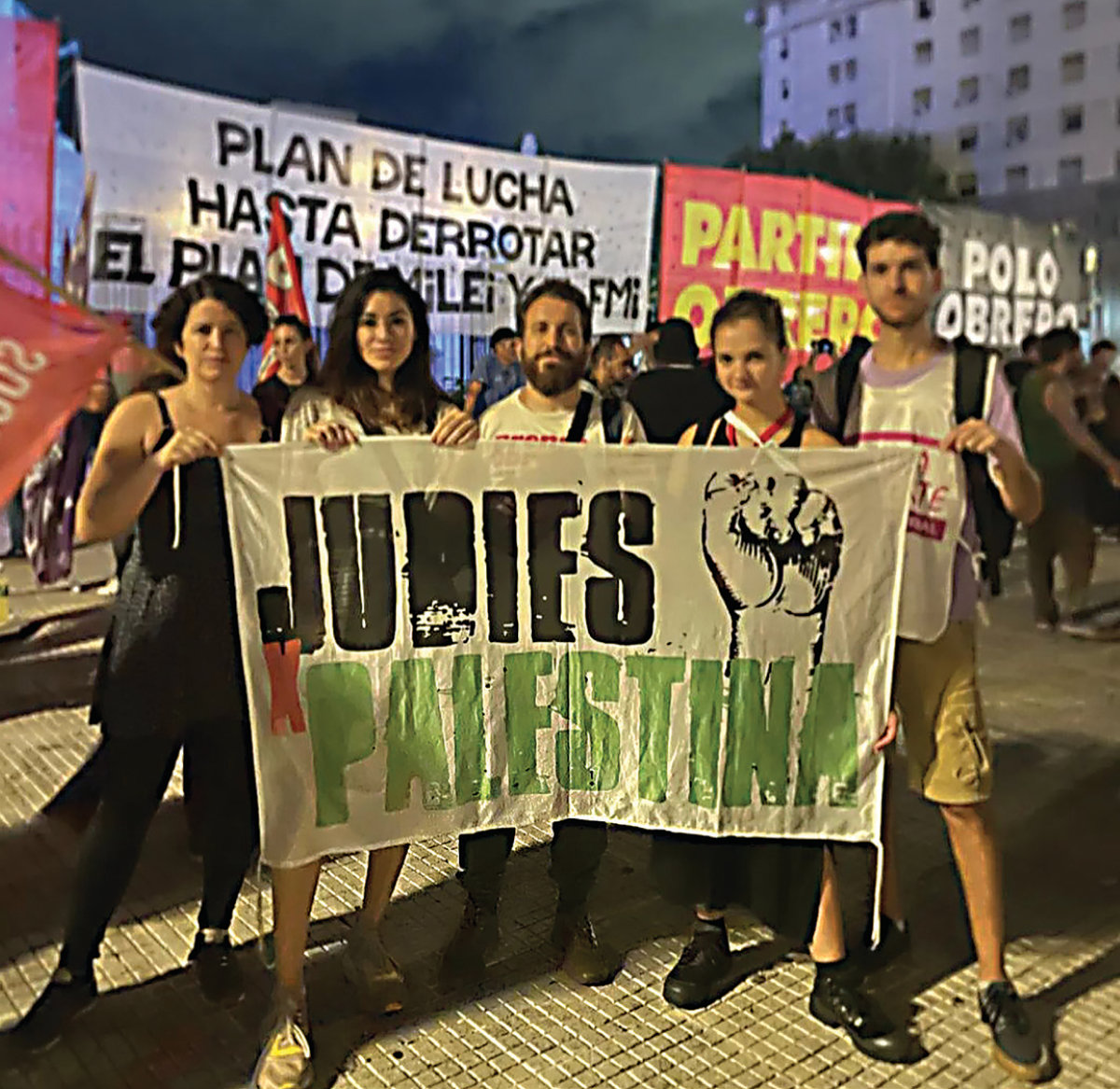
In Argentina, the Latin American country with the largest Jewish community, Judies X Palestina (Jews for Palestine) has been active since 2021 but gained momentum during the current conflict. (Supplied)
“There are few anti-Zionist voices in Argentina. Most journalists who used to criticize Israel have been silenced by the Zionist lobby in the media,” group member Ivan Zeta told Arab News, adding that the power of Zionist institutions is high in Argentina so many pro-Palestine Jews are obliged to use aliases to avoid persecution, as he has done.
“The current government (led by right-wing President Javier Milei) is totally aligned with Israel.”
Although he was born and raised as a Roman Catholic, Milei has been studying the Torah, and declared on several occasions his intention to convert to Judaism. His first international trip as Argentina’s president was to Israel.
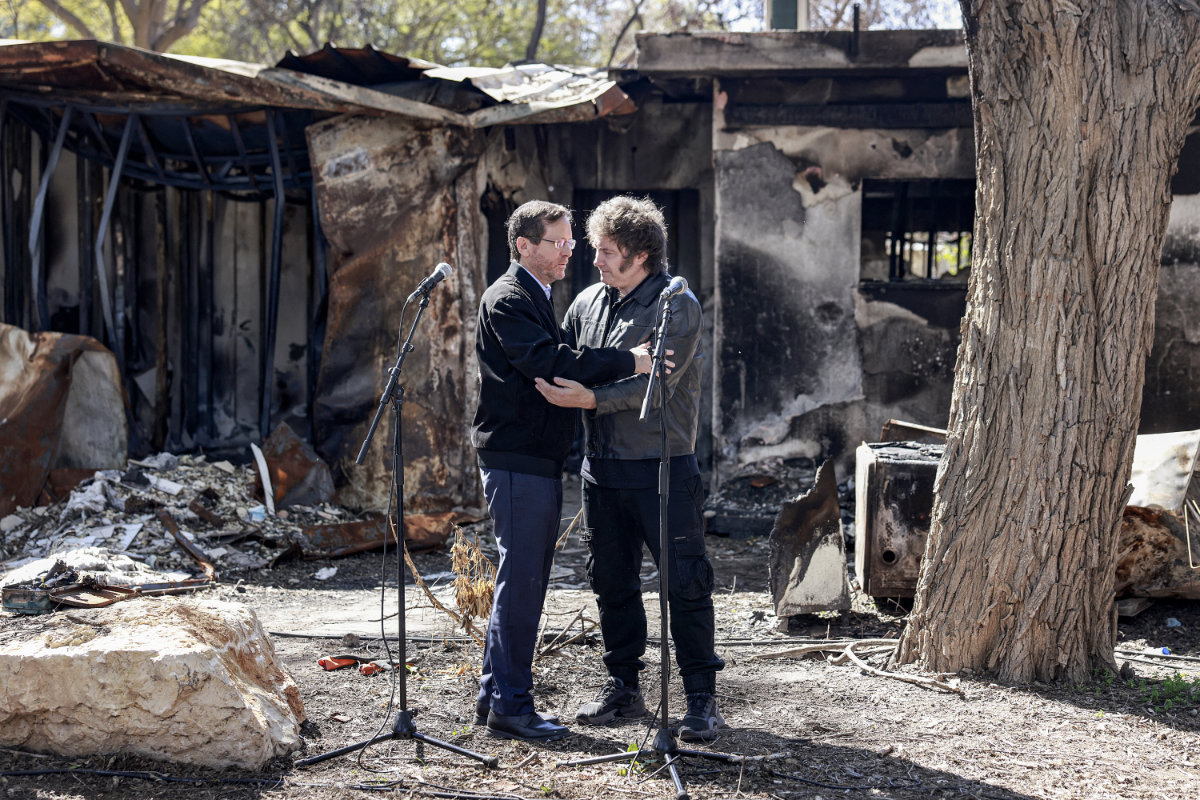
Argentina's President Javier Milei (R) embraces Israel's President Isaac Herzog during a tour around Kibbutz Nir Oz — one the places targeted by Hamas militants from the Gaza Strip during the October 7, 2023 attacks — in southern Israel on February 8, 2024. (AFP)
Zeta said the 2001 economic crisis led many Argentinian Jews to move to Israel. That process further strengthened ties between Argentina’s Jewish community and Israel.
“We know people who used to criticize Israel’s stance on the Palestinians, but due to the fact that they have relatives there, they feared for their families on Oct. 7 (when Hamas attacked Israel) and have partially accepted the idea that Israelis are the victims now,” said Zeta, who has family members who live in Israel.
A distant cousin of his is among the Israelis kidnapped by Hamas.
“That doesn’t affect me in a direct way because I don’t know her, but part of my family supports a stronger Israeli offensive against Gazans because of her kidnap, and I had conflicts with them,” Zeta said.
INNUMBERS
• 60,000 Jews living in Mexico.
• 200,000+ Jews living in Argentina.
• 120,000+ Jews living in Brazil.
Family quarrels are common for most members of Judies X Palestina. Some of them even had to cut ties with all their relatives after taking a pro-Palestinian stance.
Their colleagues try to help them and give them psychological support, Zeta said, adding that verbal abuse is common on social media as well.
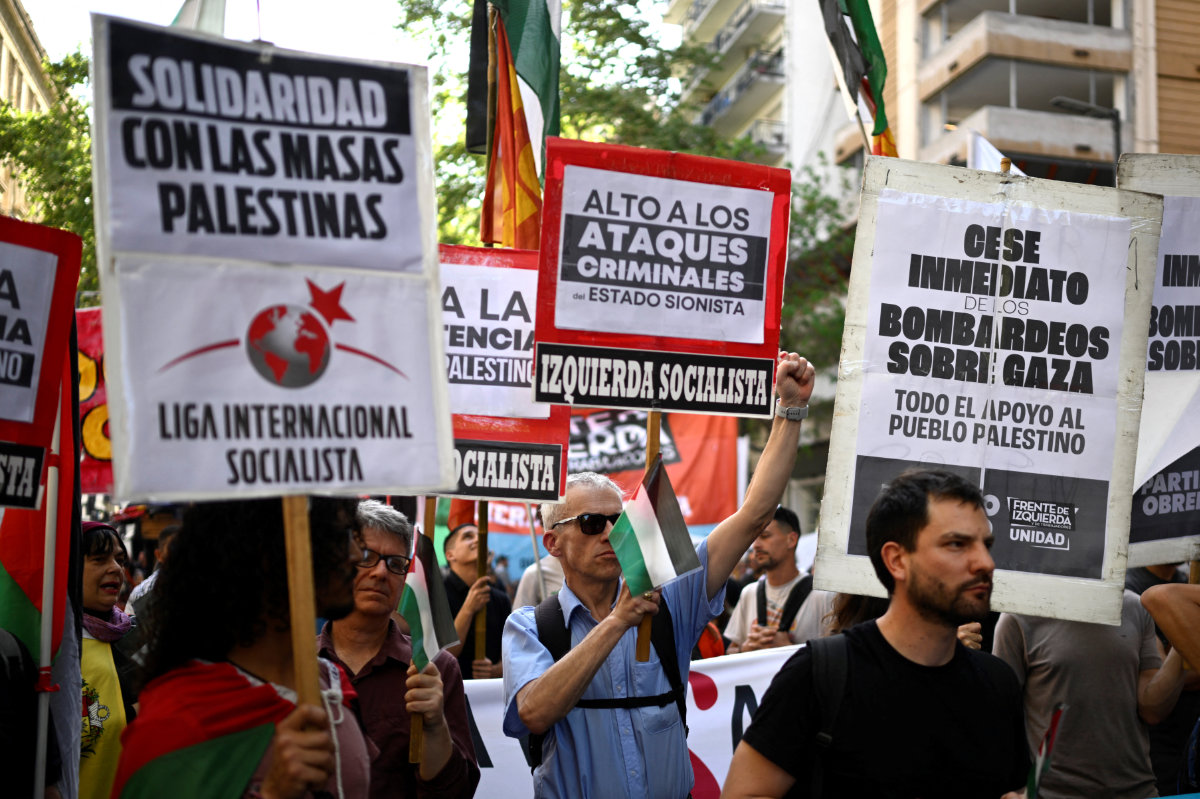
Demonstrators take part in a rally in support for the Palestinian people in front of the Israeli embassy in Buenos Aires, on October 9, 2023, after Israel imposed a total siege on the Gaza Strip. (AFP)
The group — formed by more than 50 activists, mostly from Buenos Aires — has been enthusiastically welcomed by other pro-Palestine movements, most of them composed of people of Arab descent and left-wingers.
“They’re grateful for our presence. With us there, marching side by side with them, there are less accusations of antisemitism against them,” Zeta said.
In Brazil, a group called Vozes Judaicas por Libertacao (Jewish Voices for Liberation), formed in 2014, has been galvanized since the start of the current conflict.
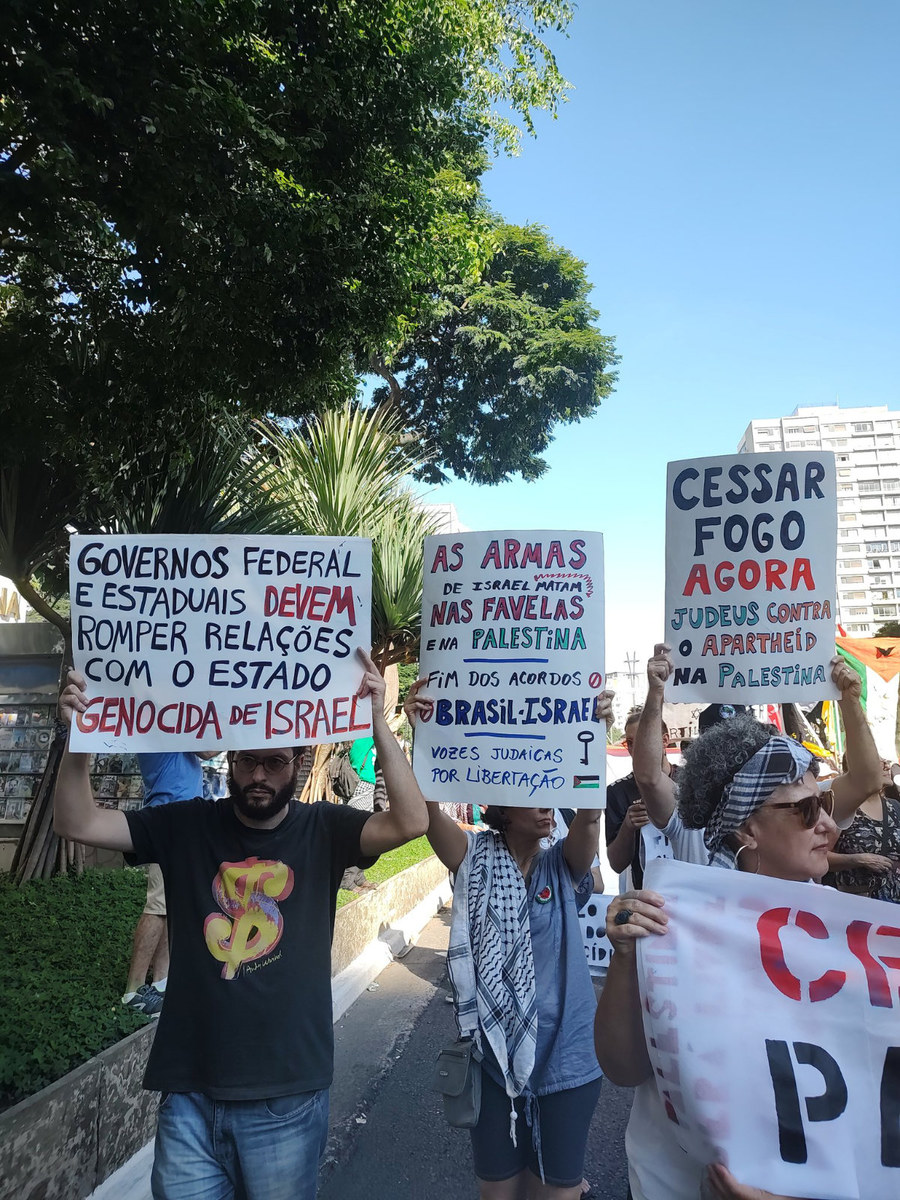
Protesters carry posters from Coletivo Vozes Judaicas pela Libertação at the last pro-Palestine event in São Paulo, Brazil. (X: @ajuliaarara)
“Those initial members met again during pro-Palestine marches at the end of 2023. We’re now well-organized, with weekly meetings and several activities,” member Daniela Fajer told Arab News.
About 30 Brazilian Jews are directly involved in the network, mostly in Sao Paulo. In Rio de Janeiro, there is another anti-Zionist Jewish movement.
“Since we released a statement in defense of President Luiz Inacio Lula da Silva (who was condemned by Zionists after he criticized Israel’s military operations and compared the mass killing of Palestinians to the Holocaust), more and more people have been interested in joining us,” Fajer said.
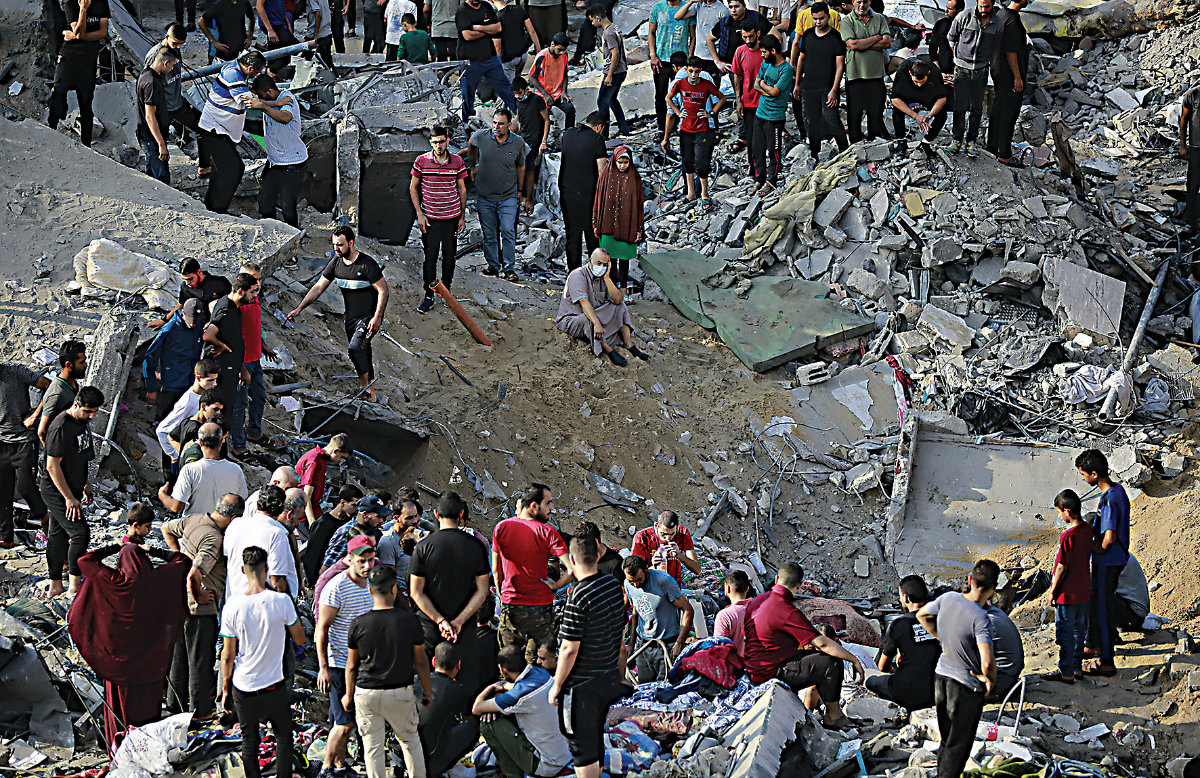
Palestinians check the destruction in the aftermath of an Israeli strike the previous night in the Jabalia camp for Palestinian refugees in the Gaza Strip, on November 1, 2023. (AFP/File)
Vozes Judaicas is part of Sao Paulo’s Front in Defense of the Palestinian People, and helps the committee organize pro-Palestine marches and public activities.
“Most members had a Zionist education and visited Israel during school. Most had to break up with Zionist relatives. I only talk to half of my family nowadays,” she told Arab News.
Some activists worked as teachers in Jewish schools and lost their jobs due to their criticism of Israel.
The Jewish community has been continuously attacking the group on social media. “They insult us and call us traitors. It’s like we can’t be Jews and anti-Zionist,” Fajer said.
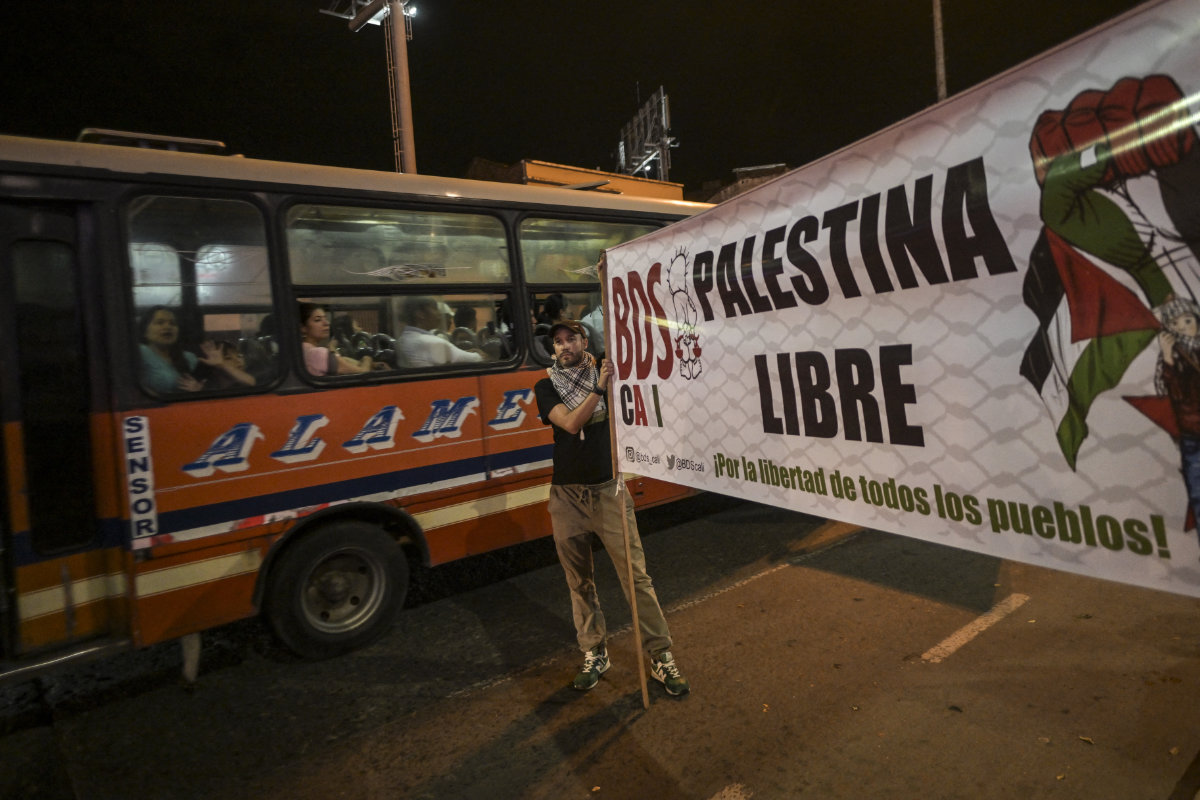
Activists calling for a "Free Palestine" demonstrate in Cali, Colombia, on October 13, 2023, in support of Palestinians amid Israeli air strikes on Gaza in reprisal for a surprise Hamas attack on October 7, 2023. (AFP)
Brazilian journalist Breno Altman knows well how strong Zionist pressure can be. The son of a leftwing anti-Zionist, he saw when his late father’s car was set on fire in 1982 during a protest against the Sabra and Shatila massacres of Palestinian refugees.
“My father was leading a demonstration when that attack happened. The criminals were never identified, but we suspected they were far-right Zionists,” Altman told Arab News.
Since October, he has been continuously denouncing Israel’s atrocities in Gaza. The website he founded years ago, Opera Mundi, is hosted by a major Brazilian news portal and disseminates critical views about the Israeli operation — something that the South American country’s press generally fails to do.
READ MORE:
• How pro-Palestine digital activists in Latin America are offering an uncensored view on Gaza
• Latin American Muslims criticize regional interfaith leaders over stand on Gaza war
• Are Latin American countries forming a pro-Palestinian bloc?
• How Latin America’s Indigenous groups are showing solidarity with Palestinians in Gaza
Altman has been subjected to a hate campaign, and is being sued by a Jewish institution in Brazil for his comments. He has also received threats on social media, including death threats.
“I filed a police report about a threat discovered by a news website. They said they wanted to cut off my fingers and break my teeth,” Altman said.

Journalist Breno Altman (4th from right) is pictured with members of the Articulação Judaica de Esquerda (Jewish Left Articulation) during an event on April 6 at the Sarau Palestine in Santa Teresa, Rio de Janeiro, Brazil. The event also featured the participation of congresswoman Jandira Feghali. (X: @AJEOficial)
Nevertheless, he thinks that more and more people, including Jews, are aware of the “genocide perpetrated in Gaza and of the problems of Zionism.”
He added: “The groups of anti-Zionist Jews are still a minority, but they’ve been able to successfully express their dissenting stances on social media.”
Altman recently published a book called “Contra o Sionismo: Retrato de uma Doutrina Colonial e Racista” (“Against Zionism: A Portrait of a Colonial and Racist Doctrine”), and has been traveling to launch it in a number of cities.
“Many students are attending the events. Some Jews told me things like, ‘I used to be a Zionist, but I changed my mind after seeing your comments,’” he said.

Demonstrators carry the Venezuelan and Palestinian flags during a rally in support of Palestinians in Valencia, Carabobo state, Venezuela, on October 13, 2023. (AFP)
In Mexico, where around 60,000 Jews live, the Zionist movement is not as strong as it is in Brazil and Argentina, Enrique Rajchenberg, a member of Jews for Palestine in Mexico, told Arab News. Nonetheless, he said, he and his colleagues face insults and threats.
Many anti-Zionist Jews are part of pro-Palestine collectives in Mexican universities, and academic movements have been very active in promoting marches, conferences and cultural activities, Rajchenberg said, adding: “We organize talks with students and labor unions.”
Jews for Palestine demands that all university presidents in the country cut ties with academic institutions in Israel

Mexican citizens take part in a demonstration outside the Israeli Embassy in Mexico City on October 12, 2023, to show their support to Palestinians and against Israel's military operations in Gaza. (AFP)
The group is also asking Mexican President Andres Manuel Lopez Obrador, and other progressive counterparts in Latin America, to cancel any military collaboration with Israel.
“Lopez Obrador is among the Latin American progressive leaders with the weakest stances on the genocide in Gaza,” Rajchenberg said.
“Mexico has strong economic ties with the US, and strong condemnation of Israel would certainly create problems for him.”
The new Jewish anti-Zionist movements in Latin America have been seeking and establishing connections with each other and with similar groups worldwide. “Our goal now is to create a Latin American network of anti-Zionist organizations,” Zeta said.


























